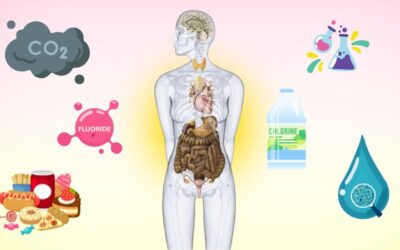It seems like more and more people at younger ages are suffering from acid reflux or GERD. This comes as no surprise, as gut related issues have skyrocketed due to the increase in processed foods, toxins, radiation, and other environmental threats we face in the modern world today.
Gastroesophageal reflux disease (GERD), also known as acid reflux, is a chronic digestive disorder that occurs when stomach acid frequently flows back into the esophagus. This backflow of stomach acid can irritate the lining of the esophagus and lead to a variety of uncomfortable symptoms.
Here are some common symptoms and characteristics associated with GERD:
- Heartburn: Heartburn is the most typical symptom of GERD. It is described as a burning sensation in the chest that may radiate up into the throat. It often occurs after eating, particularly when lying down or bending over.
- Regurgitation: Regurgitation is when stomach contents, including acid and food, flow back into the mouth or throat. It can result in a sour or bitter taste in the mouth.
- Difficulty swallowing: GERD can lead to a narrowing of the esophagus (known as esophageal stricture) due to chronic irritation. This can make it challenging and painful to swallow food or liquids.
- Chest pain: Some individuals with GERD may experience chest pain that can be mistaken for heart-related issues. This pain may be sharp, and it can be confused with a heart attack, although it is typically less severe.
- Chronic cough: GERD can cause irritation and inflammation in the airways, leading to a chronic cough that does not respond to typical cough remedies.
- Hoarseness: Stomach acid can irritate the vocal cords, leading to hoarseness or a raspy voice.
- Wheezing: Wheezing or asthma-like symptoms may develop in individuals with GERD, especially when acid reaches the airways.
- Sore throat: The acid reflux can cause a persistent sore throat.
- Dental problems: Frequent exposure to stomach acid can lead to tooth erosion and other dental issues.
What Causes GERD?
Here’s an explanation of the process:
Hydrochloric acid (HCL) in the stomach plays a crucial role in breaking down food and facilitating nutrient absorption into the body. It also maintains a delicate balance between beneficial and harmful microorganisms. Ideally, stomach acid should have a pH level ranging from 1 to 3, making it highly acidic.
To put this into perspective, a balanced pH level is around 7.2. Any pH value above 7.2 is considered alkaline, while anything below is considered acidic. Each step away from 7 on the pH scale represents a tenfold difference in acidity. For example, a pH of 6 is ten times more acidic than a pH of 7.
Different parts of the body have varying pH values. While you may strive for alkalinity in your blood or urine, the stomach should maintain its acidic pH. This acidity is essential for activating the pepsin enzyme, which is released in the stomach when the pH is between 1 and 3. Pepsin serves as a primary catalyst for breaking down proteins, aiding in nutrient and mineral absorption, and controlling microorganism populations.
Insufficient levels of pepsin or HCL can lead to symptoms such as gas, bloating, and an imbalanced immune system due to disrupted microbe populations. The stomach acid is helpful in keeping the “bad” pathogens like H. pylori and Candida at bay; when the stomach acid is low, those pathogens can flourish.
Additionally, inadequate stomach acid can result in acid reflux, as the valve separating the stomach from the esophagus may not close properly without sufficient acidity. This can cause enzymes and acid to flow back into the esophagus, leading to chronic coughing, asthma, or a sensation of a lump in the throat. It’s worth noting that antacids, which are meant to reduce acidity, can exacerbate this issue if the valve fails to close properly, allowing enzymes to enter the esophagus.
Acid Reflux is from too little stomach acid, not too much stomach acid.
GERD Medications
Omeprazole, known as Prilosec, belongs to the class of drugs called proton-pump inhibitors (PPIs). It is commonly prescribed in the United States to address conditions like heartburn, stomach ulcers, and gastroesophageal reflux disease (GERD), ranking as the sixth most frequently prescribed medication in the country.
Other PPIs, including lansoprazole (Prevacid), pantoprazole (Protonix), rabeprazole (AcipHex), and esomeprazole (Nexium), are also commonly used for the purpose of reducing stomach acid. However, this approach to alleviating GERD is often misguided.
It’s noteworthy that approximately 200 million PPI prescriptions are filled in the U.S., but it is estimated that as many as 70% of those taking them may not actually require these medications. This doesn’t include the over the counter medications.
Originally developed for the treatment of specific severe conditions like bleeding ulcers, severe acid reflux causing esophageal damage, and the rare condition known as Zollinger-Ellison syndrome, which leads to excessive stomach acid production, proton pump inhibitors (PPIs) were not intended for everyday heartburn relief.
Moreover, their recommended usage is limited to short-term periods. Prolonged use can lead to dependency and pose significant risks. Surprisingly, PPIs are frequently prescribed to hospital patients, and many continue taking them after leaving the hospital, often without a clear plan to discontinue usage. In fact, as many as 80% of patients receive inappropriate PPI prescriptions upon discharge.
These medications can have severe consequences, as they have been linked to various adverse effects, including:
- Osteoporosis and associated fractures
- Community-acquired pneumonia
- Clostridium difficile colitis
- Cardiovascular complications
- Hypomagnesemia, characterized by low magnesium levels.
- Long-term use of PPIs (more than two years) has been associated with an increased risk of vitamin B12 deficiency
- Research has even suggested a potential link between PPIs and dementia, to the extent that some researchers have concluded that avoiding PPI medication might help prevent the development of dementia
- Low nitric oxide has been linked to heart disease, impotence, and other vasodilation issues
- Small intestinal bacterial overgrowth and gut infections: common bacteria that take hold include salmonella, shigella, campylobacter spp, and clostridium difficile
Research Links Heartburn to Dementia
Watch my video where I discuss recent research linking long-term use of PPI’s to Dementia.
Nitric Oxide and PPIs
Some studies have suggested that PPIs might have the potential to reduce nitric oxide levels. It is thought to involve interference with the body’s ability to produce nitric oxide. This reduction in nitric oxide could potentially have implications for cardiovascular health and other bodily functions.
Nitric Oxide (NO) is a molecule that plays a crucial role in various physiological processes, including the relaxation of blood vessels (vasodilation) and the regulation of blood pressure. It also has anti-inflammatory and anti-platelet effects. Adequate Nitric Oxide levels are important for overall cardiovascular health.

Nitric Oxide (NO) is a vital molecule in the body that plays a significant role in various physiological processes. When Nitric Oxide levels are too low, it can have several adverse effects on health and well-being. Some potential side effects of low nitric oxide levels include:
- Poor cardiovascular health: Nitric Oxide is essential for the relaxation of blood vessels (vasodilation), which helps regulate blood pressure and improve blood flow. Low Nitric Oxide levels can lead to higher blood pressure, increased risk of hypertension, and reduced circulation, potentially contributing to heart disease.
- Reduced exercise tolerance: Inadequate Nitric Oxide can impair the ability of blood vessels to dilate during physical activity. This can lead to reduced oxygen delivery to muscles, causing fatigue and limiting exercise performance.
- Erectile dysfunction: Nitric Oxide plays a crucial role in penile blood vessel relaxation, allowing for increased blood flow to the erectile tissue. Low nitric Oxide levels can contribute to erectile dysfunction in men.
- Impaired cognitive function: Some studies suggest that Nitric Oxide may have a role in cognitive function and memory. Low Nitric Oxide levels could potentially affect brain health, though the exact mechanisms are not fully understood.
- Increased oxidative stress: Low Nitric Oxide levels can lead to increased oxidative stress in the body. Oxidative stress is associated with various chronic diseases and can damage cells and DNA.
- Immune dysfunction: Nitric Oxide is involved in the immune response and can help fight off infections. Low Nitric Oxide levels may compromise the body’s ability to combat pathogens effectively.
- Digestive issues: Nitric Oxide plays a role in regulating gastrointestinal function, including the relaxation of the lower esophageal sphincter (LES). Low Nitric Oxide levels could contribute to digestive problems like acid reflux and GERD. In other words, people with GERD take PPIs to help with the GERD, only to make it worse by reducing Nitric Oxide and worsening GERD symptoms.
While PPIs were originally designed for specific medical conditions and short-term use, their widespread and often inappropriate prescription has led to various health risks, especially worsening GERD and lowering nitric oxide which leads to a cascade of health issues.
Top Supplements to Help Alleviate GERD
HCL Guard+
As we age, our stomachs may need a little help with acid production to keep our muscles, hair, skin, and cells healthy. HCL Guard+ is a supplement designed to support your stomach and help with issues like constipation, diarrhea, heartburn, bloating, burping, and even hair, skin, and nail health.
Why HCL Guard+ is Essential
A healthy stomach produces strong acid to:
- Break down food
- Digest proteins
- Release essential nutrients
- Kill harmful pathogens
- Promote efficient digestion
How HCL Guard+ Helps
- Enhances nutrient and amino acid digestion for better energy and overall health
- Supports defenses against harmful organisms
- Helps repair stomach cells and the mucus layer
- Stimulates proper food movement through your digestive system
HCL Guard+ mimics your body’s natural processes, providing the extra support your stomach needs to keep you feeling great.
Accelerated Fast®
The biggest risks causing GERD are highly processed foods, alcohol, and carbs. Accelerated Fast® helps suppress appetite and cravings for these foods, and supports intermittent fasting which heals the whole digestive system quickly, including GERD symptoms. Not only that, but the additional ingredients help reduce fatty liver disease and help cleanse the liver which is an integral part of digestion. The Trikatu in the formula helps “heat up” the digestion, improve absorption, and increase assimilation – all factors that suffer when GERD is present.
MegaGuard
MegaGuard contains licorice flavonoids that have been extensively researched for their potent antioxidant properties and their ability to alleviate gastric discomfort and GERD. Several studies have demonstrated their effectiveness in enhancing gastric acidity, ameliorating ulcer index scores, and reducing the colonization of H. pylori bacteria.
Artichoke leaf extract contains cynaropicrin, a bitter compound known to support the flow of bile, provide hepatoprotection, and alleviate symptoms such as bloating and fullness.
Delayed gastric emptying can exert pressure on the lower esophageal sphincter, resulting in acid regurgitation. Concentrated gingerols have the potential to enhance gastric emptying and boost motility in the upper segments of the small intestine. Ginger extract is recognized as a true prokinetic agent due to its ability to inhibit cholinergic M3 and serotonergic 5-HT3 receptors in the gastrointestinal tract.
MegaIgG2000 Powder
Serum-derived immunoglobulins (SBI) have been observed to form bonds with H. pylori, C. difficile, and various other bacterial toxins associated with GERD. These binding interactions have demonstrated their ability to neutralize these toxins, resulting in notable enhancements in abdominal pain relief, reduced bloating, and decreased flatulence.
Additional Supplements to Help Manage GERD Naturally
Berberine
Most people have GERD as a result from eating processed foods and sugar. Berberine helps with glucose control, as it activates an enzyme, adenosine monophosphate-activated protein kinase (AMPK), which helps regulate metabolism. It also helps improve insulin sensitivity and improve appetite control so that it is easier to abstain from the foods causing GERD.
Because hydrochloric acid (and pepsin) is needed to break down protein in the intestinal tract, reduced levels of HCL in people with GERD have a compromised ability to absorb nutrients and a higher risk of dysbiosis, which is an imbalance in the gut between the bad and good bacteria. So, the HCL in the formula helps lower the stomach acid to help with digestion and control the acid from coming up the esophagus and keep the bad pathogens, like H. pylori, parasites, fungi, and salmonella from taking over.
Accelerated Ancient Salt®
This is a salt with over 62 alkaline minerals that can help with nausea, and help with balance the acidity associated with GERD. It also has a negative charge that efficiently attracts positively charged toxins, parasites, and undigested fats. Furthermore, the Accelerated Ancient Salt® will help your body make sufficient amounts of hydrochloric acid (stomach acid) naturally.
Obtained from pure, unaltered, and unspoiled ancient seabeds and sea salt originating from pristine locations, this Accelerated Ancient Salt® contains no harmful or synthetic additives.
Including a blend of five revered salts collected from High-Frequency regions in the Andes Mountains, the Himalayas, and Utah, this salt is additionally infused with Scalar frequency to elevate its rejuvenating attributes. The resulting Scalar energy embodies an elevated frequency that aids in the organization of DNA.
MegaSporeBiotic
GERD creates an environment that allows the microbiome to become unbalanced. MegaSporeBiotic supports a diverse microbial population and maintains a healthy gut barrier.
MegaSporeBiotic consists of a probiotic mix containing five bacillus spores that have demonstrated the ability to support a healthy gut barrier and immune function. The bacillus spores follow a biphasic life cycle, allowing them to stay dormant in challenging environments until they reach more favorable conditions, such as the human gastrointestinal tract. Once they reach the large intestine, these inactive spores can transition into their active, vegetative forms and commence colonization within the gut.
This unique probiotic blend is designed to recondition the gut rather than simply introducing probiotic strains that may not survive the digestive process or effectively colonize the gut.
HU58
This is a single-strain probiotic with a large dose of bacillus subtilis, specifically formulated to help support healthy immunity, SIBO, and digestion. Bacillus subtilis helps digestion by increasing the digestive enzymes in the gut, including amylase, protease, and lipase among others; this helps negate GERD issues.
Accelerated Cellular Detox® Powder
The combination of the six organic ingredients in this formula help reduce inflammation in the gut, soak up the toxins that could contribute to acid reflux, and balance the gut pH.
Accelerated Celular Detox® Powder helps absorb alcohol and other toxic chemicals, improve bowel regularity, reduce gas and burping, and supports liver and kidney detoxification. Furthermore, the slippery elm in the formula coats and soothes the mouth, throat, stomach and intestines, and helps inflammation in the bowels. It stimulates nerve endings in your gastrointestinal tract, which in turn, increases mucus secretion and protects against ulcers and excess acidity.
Lifestyle Changes to Alleviate GERD

- Eliminate processed foods. Processed foods destroy the healthy microbiome, encouraging the overpopulation of the bad bacteria. Furthermore, it is absent of the good fiber and “food” to feed the good bacteria.
- Increase the right vegetables. Vegetables mostly have the right enzymes and are alkaline in nature to help balance the acidity and digestion. Some “healthy” vegetables that are full of nutrients and alkaline contain components that may actually be blocking your detox pathways; these include ones in the oxalate, sulfur, lectin, and mold categories. Make sure you choose the vegetables that work for your body.
- Don’t eat three hours before bed. Eating too late can slow down digestion and cause acid reflux to be worse while you try to sleep.
- Eliminate alcohol and coffee (temporarily). Both alcohol and coffee are extremely acidic and will worsen acid reflux symptoms. Once the symptoms are under control, you can return to drinking coffee and alcohol in moderation.
- Add baking soda to your water. By adding 1 teaspoon of baking soda to your water, the symptoms of GERD will diminish.
- Apple cider vinegar. Taking this with your meals helps provide the needed acid to help break down your food.
Use ginger. Ginger tea helps decrease the pressure on the lower esophageal sphincter, helping reduce the acid reflux symptoms. Ginger also helps accelerate gastric emptying and helps suppress H. pylori– both will help with symptoms
Sara Banta
Sara Banta is a Stanford University Graduate with a Degree in Economics and Psychology, and a certified Natural Supplement Expert & Graduate of the Institute for Integrative Nutrition. Sara is the Founder of Accelerated Health Products and host of the health & wellness podcast, Accelerated Health Radio.
- Sara Bantahttps://sarabantahealth.com/author/sarabanta/
- Sara Bantahttps://sarabantahealth.com/author/sarabanta/
- Sara Bantahttps://sarabantahealth.com/author/sarabanta/
- Sara Bantahttps://sarabantahealth.com/author/sarabanta/









